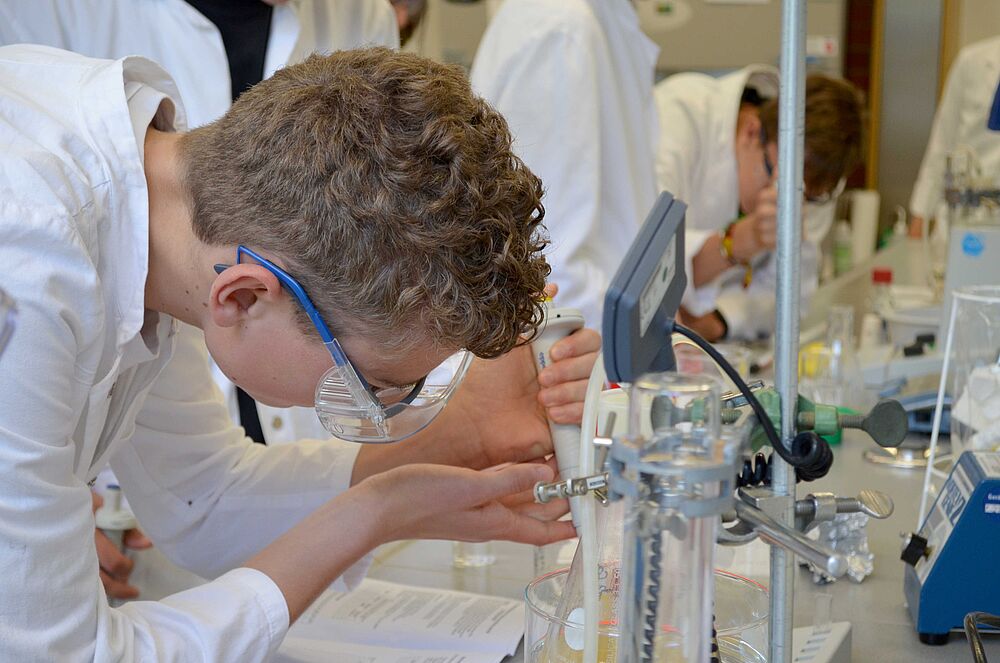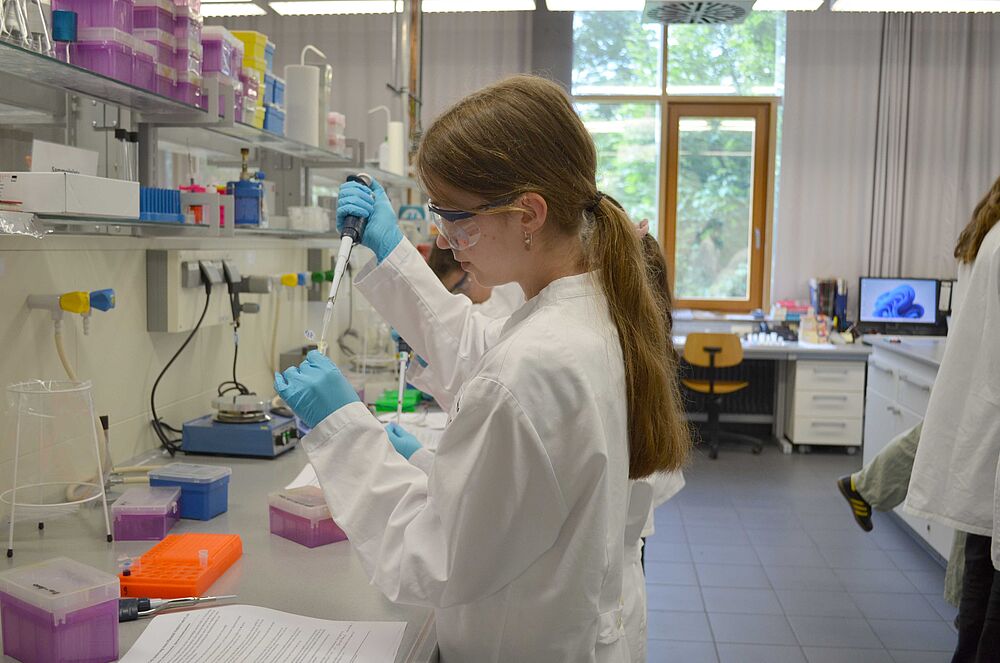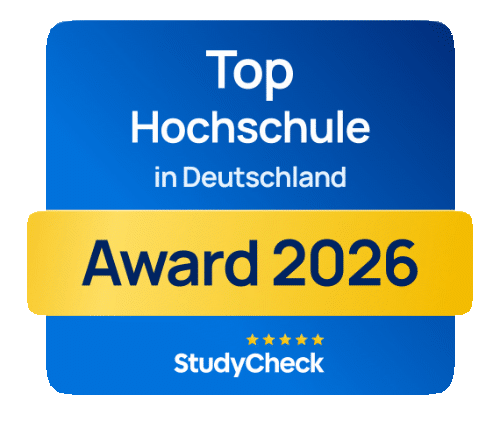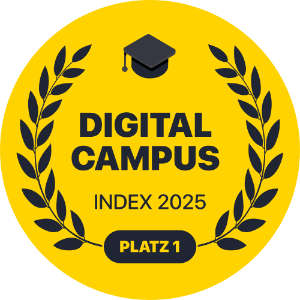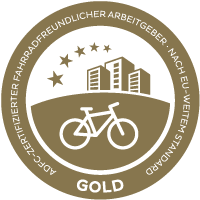The Summer Academy is offering interested secondary school students from years 9 to 13 the chance to get a taste of university life at Ansbach University of Applied Sciences.
When: 21 to 24 July 2025
from 09.00 am to 12.30 pm (incl. short breaks)
Where: Ansbach University of Applied Sciences
(main campus and Retti campus)
This year, for the first time, all faculties (Engineering, Business and Media) will be offering workshops.
The Summer Academy’s workshop programme will be published on this site soon.
Pupils can organise their participation in our Summer Academy individually by choosing the workshops according to their interests. In addition to individual registration by pupils themselves, class registrations by teachers are also possible.
Please note: The number of participants is limited to 10 people per workshop. It pays to be quick!
If you have any questions or require further information, please contact the General Student Advisory Service at Ansbach University of Applied Sciences:
studienberatung(at)hs-ansbach.de or 0981/4877-574.
Monday, 21.07.2025 - Technology workshops
| Workshop | The description | Capacity | Location |
| Wind power: Get the maximum out of it! | Discover the power of the wind! In groups, you will investigate how much electrical power you can generate with a fun wind power model. Who will get the most out of it? | 10 | Campus Ansbach |
| Experience biotechnology - do-it-yourself bubble tea | You can make your own bubble tea by making bubbles (alginate gel balls) and then mixing them with drinks of your choice. | 10 | Campus Ansbach |
| Fuel cells & solar-hydrogen technology | Discover the fascinating technologies of solar hydrogen production and electricity generation. | 10 | Campus Ansbach Residenzstraße 8 91522 Ansbach |
| Investigations into the lotus effect | Tracking down the lotus effect: We use various microscopes and many other measuring methods to investigate what makes up the lotus effect. | 10 | Campus Ansbach Residenzstraße 8 91522 Ansbach |
| Build and programme your own sorting robot with Lego Spike | From building the robot to the first test drive and the use of sensors - build and programme your own sorting robot step by step. | 10 | Retti-Campus Rettistraße 56 91522 Ansbach |
| Programming Tello drones | The Tello RoboMaster is a programmable drone designed specifically for learning robotics and programming. It supports visual programming languages such as Scratch as well as advanced control methods with Python and Swift to develop flight manoeuvres and AI applications. As a result, it offers a practice-orientated learning platform that is suitable for both beginners and advanced users. | 20 | Campus Feuchtwangen An der Hochschule 1 91555 Feuchtwangen |
Tuesday, 22.07.2025 - Technology workshops
| Workshop | The description | Capacity | Location |
| Sustainable product design made of wood | Stylish pieces of jewellery made of wood designed by yourself and built by yourself. | 8 | Campus Ansbach Residenzstraße 8 91522 Ansbach |
| Electrical adventure: Electrical engineering? We already knew that! | Immerse yourself in the fascinating world of electrical engineering! Here we show you how electricity works and let you and let you experience the power of electricity the power of electricity. | 10 | Campus Ansbach Residenzstraße 8 91522 Ansbach |
| Visualise weather data visualise | In this workshop we will use Jupyter notebooks weather data such as temperature, air pressure, humidity and wind speed in interactive charts and create our own weather maps and create our own weather maps. | 10 | Campus Ansbach Residenzstraße 8 91522 Ansbach |
| Your knee - Medical and orthopaedic Magic in diagnosis and therapy | This workshop offers you exciting insights into the diagnosis and treatment of diseases and injuries injuries of the knee joint. | 12 | Campus Ansbach Residenzstraße 8 91522 Ansbach |
| 3D printing and sustainabilityt | Recycling a PET bottle into a 3D-printed mobile phone gadget mobile phone gadget | 10 | Campus Ansbach Residenzstraße 8 91522 Ansbach |
| Insight into the world of AI with Teachable Machine | Gain exciting insights into the world of AI by your own artificial intelligence with Teachable Machine and try it out directly. | 10 | Retti-Campus |
| IoT Internet of Things | The IoT workshop teaches the basics of the Internet of Things, including networking and controlling devices over the Internet. Participants will learn how sensors, microcontrollers and cloud platforms interact with each other to develop intelligent and automated systems through practical IoT smart home kits. The workshop combines theoretical knowledge with practical relevance and thus promotes a deep understanding of the integration of hardware and software in networked applications. | 20 | Campus Feuchtwangen An der Hochschule 1 91555 Feuchtwangen |
Wednesday, 23.07.2025 - Business workshops
| Workshop | The description | Capacity | Location |
| One-Euro-Business | Basic business knowledge is taught using a business plan for a company to be founded, after which the participants draw up a cursory business plan themselves and present the results. | 30 | Campus Ansbach Residenzstraße 8 91522 Ansbach |
| Playfully shaping the future shaping the future - a workshop with Lego Serious Play | Lego Serious Play is a playful method for solving (business) (business) problems. It enables teams to understand complex challenges, create a common picture and find solutions. | 12 | Campus Ansbach Residenzstraße 8 91522 Ansbach |
| NAO as a social robot - Interaction, familiarisation and operating a humanoid robot | Participants will have their first contact with humanoid, social robots, understand how they work and interact with the robots. To this end, the robots will present their skills, communicate with the participants and, for example, answer their questions. It is also possible to physically interact with the robots and control them, gaining initial experience of how research is carried out with social robots, what the pitfalls are and what areas of application there are. The programme is very freely designed and offers space to try things out and gain experience. The entire interaction is accompanied by explanations and information about artificial intelligence and social robots. | 20 | Campus Ansbach Residenzstraße 8 91522 Ansbach |
| Data checked: Your entry into the world of data analysis | In this interactive workshop, you will immerse yourself in the exciting world of data analysis and empirical methods. You will learn how to collect, analyse and interpret data - in a creative and understandable way.With practical exercises and illustrative examples, you will become a data analyst and discover how you can gain real insights from numbers.The workshop not only offers you exciting insights into the world of working with data, but also shows you how you can use these skills in your everyday life and later career. | 15 | Campus Ansbach Residenzstraße 8 91522 Ansbach |
| Code the Vibes: Culture meets AI | Are you ready to send your robot on a world tour? in this workshop you'll turn robot Nao into an intercultural pro! with a super simple programming interface, you'll control your bot so that it has the coolest greetings and gestures from all over the world. | 15 | Campus Ansbach Residenzstraße 8 91522 Ansbach |
Thursday, 24.07.2025 - Media workshops
| Workshop | The description | Capacity | Location |
| We have our say! | We are planning and producing a short podcast. | 10 | Campus Ansbach Residenzstraße 8 91522 Ansbach |
| Make it Interactive! - Your entry into interactive technologies | Experience how creative ideas and technology come together to create interactive experiences. | 8 | Campus Ansbach Residenzstraße 8 91522 Ansbach |
| Virtual World Building | With the help of VR goggles, we create a virtual world together. | 20 | Campus Ansbach Residenzstraße 8 91522 Ansbach |
If you have any questions or require further information, please contact the General Student Advisory Service at Ansbach University of Applied Sciences: studienberatung(at)hs-ansbach.de or 0981/4877-574.
School lab - Faculty of Engineering
The school laboratory is primarily aimed at secondary school pupils. Projects are offered in the fields of natural and engineering sciences, medical technology and biotechnology.
In the school laboratory, pupils work on questions that give them a concrete insight into different scientific disciplines and their methods. They experience and discover the world of science by experimenting, working independently, experiencing things for themselves and formally grasping them.
Experiment 02: How does a modern wind turbine work?
Turning wind into electricity
The energy of the wind can be converted into electricity using modern wind turbines. The most common type is the three-bladed wind turbine with a horizontal axis. They transfer the rotation of the rotor caused by the wind to an electrical generator, which converts the rotational energy into electrical energy and feeds it into the power grid.
Pupils in years 4 to 12 can find out for themselves how important a suitable location or the angle of inclination of the blades of a wind turbine are in the energy technology laboratory with experiments on the performance of wind turbines. For example, they measure the voltage and current of wind turbines under different conditions.
Grades 4-12
Duration approx. 2 h
Number of participants max. 12
Room 92.0. 4
Availability January, February, March, July and September
Contact and booking Dipl.-Ing. (FH) Babak Esmaili (Tel: 0981/4877-326)
Experiment 03: Combustion engines, hydrogen and the energy transition
Germany wants to be climate-neutral by 2045.
It sounds strange, but combustion engines will help to achieve this goal. And this despite the ‘combustion engine ban’ in the European Union from 2035.
In a real research laboratory, we take a close-up look at how climate-neutral combustion engines are already contributing to the energy transition.
Through exciting experiments, we will familiarise ourselves with the combustion engine and turn hydrogen into electricity. If you want to discover modern technology in a hands-on way, this is the right place for you.
Class 9-13
Duration approx. 1 h
Number of participants 5-10
Availability January, February, March, July, September, October
Contact and booking Johannes Fichtner, M. Sc. (johannes.fichtner@hs-ansbach.de)
Experiment 04: Enzymes - wonders of nature
Experiments on the temperature stability of catalase
Enzymes are proteins that accelerate chemical reactions. They are also known as biocatalysts. Every cell has several thousand enzymes without which no living organism could exist. Many enzymes are used technically to manufacture products in our daily lives. These include foodstuffs, vitamins, flavourings and medicines. Enzymes are also used in environmental protection to break down toxic substances. For example, the enzyme catalase decomposes the toxic hydrogen peroxide formed during cellular respiration into water and oxygen. Hydrogen peroxide is used as a bleaching agent in the textile industry. Waste water containing hydrogen peroxide can be disposed of using catalase. This process is much more environmentally friendly than the chemical process and also saves energy. In the experiment, the dependence of catalase activity on temperature is analysed using a photometric method.
Class >10
Duration approx. 2.5 h
Number of participants 4-12
Availability January, February, March, July and September
Contact and booking Prof Dr D. Fabritius (dirk.fabritius@hs-ansbach.de)
Experiment 05: Biotechnological production
Experiments on the fermentation of yeast
Biotechnology uses microorganisms to produce pharmaceuticals, industrial chemicals or products for the food sector. For this purpose, microorganisms are cultivated in bioreactors under defined conditions and the bioproducts are then purified. In the experiment, baker's yeast is cultivated on a laboratory scale and the growth process is characterised using typical parameters. This can then be used to create a growth profile. In addition, the students get to know the equipment of a biotechnology centre, including the facilities for upstream and downstream processing (production and purification of a bioproduct).
Class >10
Duration approx. 2.5 h
Number of participants 8-18
Availability January, February, March, July and September
Contact and booking Prof. Dr S. Gaisser (sibylle.gaisser@hs-ansbach.de)
Experiment 06: Polymerase chain reaction
Experiment for the identification of E. coli safety strains
The polymerase chain reaction (PCR) is a fundamental method of molecular biology with a wide range of applications. It is used, for example, in paternity tests, to identify criminals and in various areas of medical diagnostics. The aim of our experiment is to differentiate between various E. coli strains used in the laboratory with the aid of PCR. Such a test should be carried out regularly in genetic engineering laboratories. In addition to PCR, the students also learn other basics of molecular biology, such as working with pipettes and carrying out agarose gel electrophoresis.
Year >10
Duration approx. 5 h
Number of participants 12-18
Availability February, March, July
Contact and booking Prof. Dr A. Martin (annette.martin@hs-ansbach.de)
Experiment 07: How to make bacteria glow
Genetic engineering to try out
One of the core areas of biotechnology is the genetic engineering of proteins in a suitable host organism. Recombinant proteins produced in this way are used in the medical field as drugs, for example. For example, human insulin is produced recombinantly in E. coli bacteria.
The practical course involves working with genetically modified bacteria that carry the gene for GFP (green fluorescent protein) and therefore fluoresce themselves. Standard genetic engineering methods such as plasmid preparation, restriction and gel electrophoresis are taught.
Class >10
Duration approx. 3-4 h
Number of participants 12-18
Availability February, March, July
Contact and booking Prof. Dr A. Martin (annette.martin@hs-ansbach.de)
Experiment 08: Your knee - anatomy, diagnosis and treatment of knee joint injuries
Insights into the spectrum of biomedical engineering using the example of the knee joint
The knee is the largest and most complex joint in mammals. In this practical course, you will learn about the anatomy of the knee joint and use diagnostic imaging techniques such as endoscopy and sonography (ultrasound) in team exercises. You will also receive a brief introduction to biomechanics and sports orthopaedics for the conservative and surgical treatment of injuries and wear and tear of the knee joint.
Class 9-13
Duration approx. 2-4 h Number of participants 4-24
Availability at any time by arrangement
Contact and booking Prof Dr Roland Schnurpfeil (Tel: 0981/4877-518)
Our modular system offers fascinating insights into science and technology. Pupils can experience STEM topics in a completely new way - hands-on, interactive and inspiring! For the school subjects of biology, chemistry, physics, computer science and maths, we have a wide range of hands-on activities and workshops to supplement lessons and make STEM topics tangible.
This offer is aimed at larger groups of pupils. On request, we can organise a combination of different workshops to get up to 75 pupils interested in the respective topic at the same time.
More information about the programme by email to studienberatung(at)hs-ansbach.de
Lectures to get a taste of it
Taster lectures are regular lectures that individual students can attend as guests without any obligation. The visit conveys the atmosphere at Ansbach University of Applied Sciences, the typical course of lectures and a first impression of studying. The aim is not to fully understand the content of the lecture, but merely to gain an impression and a realistic idea of a particular degree programme.
Everything at a glance
- The taster lectures offered, including the times, take place in the winter or summer semester (winter semester
01.10.-15.02., summer semester: 15.03.-31.07.). - There are no lectures on public holidays and during lecture-free periods.
- A lecture/taster lecture usually lasts 90 minutes.
- Attendance is free of charge.
- Registration is done directly via the professor indicated in the list by e-mail.
Exceptions: For groups, e.g. school classes, please contact the studienberatung(at)hs-ansbach.de! - Here you can find an overview of the taster lectures of the Faculty of Engineering!
- Here you will find an overview of the taster lectures of the Faculty of Business!
Children's University - Faculty of Technology
The Ansbach Children's University offers primary school pupils their first and early contact with Ansbach University of Applied Sciences and its facilities. The concept also gives the children age-appropriate access to experimental work in the laboratory. The laboratory practicals are adapted to the children's level of development, so there is the option of following up with further visits in higher classes to investigate more complex issues. This allows a stronger bond to develop between the pupils and the university even before they begin their studies.
At the end of each semester, i.e. in January/February and July/September, primary school classes, for example, can experience a taster day in the laboratory on request through their respective teachers. The focus is on having fun experimenting and getting to know a laboratory. The laboratory practicals at the Children's University are free of charge for schools. Please send enquiries in the field of biotechnology to Prof. Dr. Dirk Fabritius and Prof. Dr. Sibylle Gaisser.
© 2026 Hochschule Ansbach
